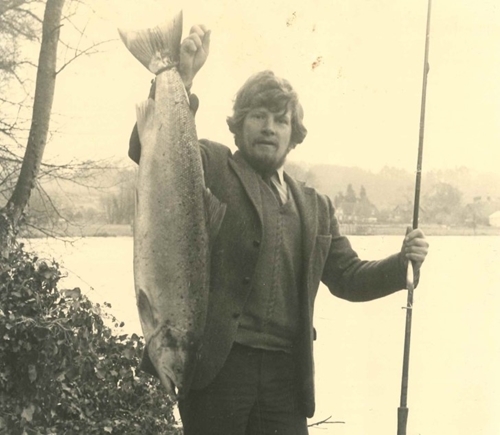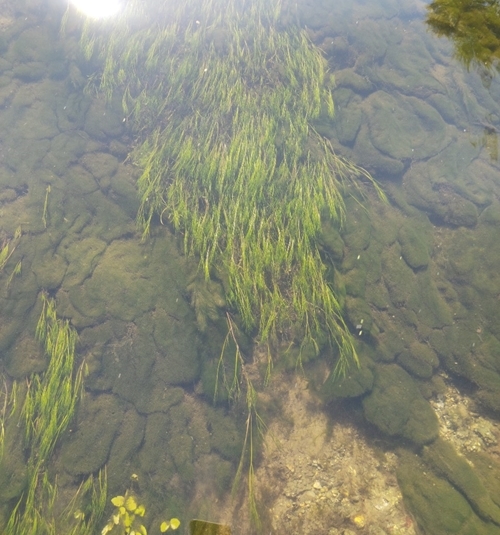By Mike Swan, GWCT Head of Education
Back in March 1982 I struck silver. I was the new apprentice game adviser at GWCT, just over two months in post. My boss, Ian McCall and I had just finished running our eight day Gamekeepers Training Course, and we took a day off to go to the local guns and tackle auction. Having bought some bits of fishing gear in the morning, Ian and his chum were anxious to get away and try for a salmon on one of the great middle beats of the Avon, so I volunteered to collect and pay after the auction finished, and drop off the gear in the evening.

Late afternoon saw me back at the office to sign off some thank you letters to visiting speakers, but then what? Well why not lob a Toby spoon across the office water? I might just get a pike or kelt (a salmon that has already spawned and is drifting back down to the sea), even if the risk of a fresh salmon was remote. Ian had schooled me in the drill – cast downstream and across, allow the lure to swing gently to our side, and then retrieve slowly before taking a long pace downstream to repeat the exercise.
On about the sixth cast, just as I was about to lift off and cast again there was a boil and a savage pull, with a big silver flash and a faint hint of lilac showing as the fish set off down and across. The reel sang, and I guess it was seventy yards away when it stopped to swing gently across the river to my side. With big obstructions just below me, I could not follow and had no option but to progressively pump it back upstream.
When it reached the spot where it took, the fish turned its head out into the current and away again, as before. I glanced at my watch when the third seventy yard run came – 5.45pm. After that began a war of circles, with the fish repeatedly using the current against me, but only running about 20 yards, before swing back to my bank.
Then, an hour later, it went off as in the first rush, and I began to wonder if I’d ever get it any nearer. But I was lucky; after this run, the fish failed to turn its head out, and I dragged it the extra two yards that allowed me to step down alongside and pull its head to the bank. I nearly lost it when trying to hand tail, because it was too big for my grasp, so I ran my fingers up the side and slipped them into the gills to drag it ashore; a 22lb cock fish. We both collapsed exhausted on the bank. Little did I then know that at the age of 26, I had caught not just my first salmon, but the best of a lifetime.
The Only Avon Fish
These days I hardly fish the office water, but for many years I’d go down after work most days in season. Not only did I never match that wonderful fish, but I have never had another ‘clean’ salmon there; just the odd kelt. We did not realise then, but we were on the edge of a precipice. Declared rod catches crashed dramatically from over 400 fish a year, and by 2010 the Avon produced just 47. I suppose that a rise to 73 in 2018 is cause for hope, but when you consider that in the mid-80s just one pool on a middle beat recorded over 60 fish in a week at prime time, you realise that any recovery is just relative.
It's not Just the Avon
If only this decline were just a story of one river failing, but sadly it is one of all the south country chalk streams. In fact, I think that some of the smaller rivers have suffered even more. For example, the lovely little river Piddle, of Tolpuddle Martyrs fame, is one that I know well, having fished it for the first time just two days before I caught that Avon Salmon, and many times each season since. On that first day I was guest of my boss, who caught a 17lb fish (his biggest ever at that stage – beating him by 5lb two days later may well have put my GWCT career in jeopardy…).
Rising in deepest darkest Dorset, and flowing into Poole Harbour at Wareham, it is but a small river, and you would hardly expect to see salmon. But, the history is of a fine spring river, with fish up to over 40lbs coming early, and a solid run of early summer fish of 10 to 15 pounds in May. Fishing with Ian, and then taking over his rod when he moved north to Scotland in ’87, we felt comfortable that, although there was a definite decline in the big early fish, we were assured of a decent fish or two in May if we fished with proper care.
But we were wrong; from about ’95 onwards, even the early summer run has failed too. Sometimes we see a fish or two later in the year, but to the best of my knowledge, no one has caught a clean spring/summer fish on ‘our’ beat for twenty plus years. Part of this is no doubt down to the rules. Most of what was caught came to a carefully fished Mepps spinner cast upstream between the weed runs, but a no spinning rule till mid-June means that the May fish are stale before we can really try for them, and this dainty little stream is just too weedy for traditional salmon fly fishing. Back in the 1980s the Piddle as a whole returned 30 or 40 fish; in 2010 it was one, and 2018 zero.
The Ills of the Chalk Streams
So, what has gone wrong? Well clearly there has been a more general salmon decline over the same time period, across the whole of its Atlantic range, and what happens at sea is very important. Everything from accidental by catch of juveniles amongst the sand eels, to direct exploitation of larger fish is implicated, and bigger issues like climate change and its effect on sea currents and nutrient level are believed to be causing negative impacts on the whole sea food chain.
Also, we should not dismiss over exploitation by anglers as a possibility either. Back when I started the rivers were fished hard, with most beats having rods out every day, and their catch went home. However, the change to catch and release has not brought a sudden resurgence, and wild trout populations are not what they were either. I think these south country streams have some special problems.
Some folk talk of global warming and its effect on river temperature, but if you don’t have water in the first place, how warm it is won’t matter. To my eye there is no doubt that summer flows in our rivers are nothing like what they were. Last year in late March the Avon was way over its banks, with the water meadows flooded, and the aquifer that feeds it was full, but by August, it was down to summer low as if we had experienced a dry winter. Abstraction of huge amounts of water from underground continues, and if it is not in the aquifer, it cannot feed the river.
Sadly, there are other problems too. Siltation and nutrient run off from ever more intensive agriculture is a big issue. If the gravels are clogged, and the flow is weak and unable to flush out the silt, salmon and trout eggs will die from lack of oxygen. Our rivers have ever higher nutrient levels, with phosphate a particular problem.
This is not just from agriculture, but sewage too. I wonder how many people yet realise that raw sewage is regularly and frequently finding its way into rivers with storm water run-off after heavy rain. 400,000 such ‘emergency’ discharges into the rivers and coastal waters of England during 2020 should surely be a national scandal.
Against this background it is hardly surprising that the clear waters of old get progressively cloudier. This in turn promotes the growth of algae, both microscopic forms in the water, and blanket weed which smothers the aquatic plants that should be there. Water buttercup (Ranunculus) is a particular issue here, as it is key to producing both the wee bugs that feed young salmonids, and the cover that they need to hide in and thrive.

GWCT has carried out much research on this on the Dorset Frome, and amongst many things, has shown that the average parr is smaller than it used to be. We also know that the smaller you are when you head to sea, the less chance that you will make it back. On top of this, salmon that have spent either one or two years at sea `before returning to their home river are now much smaller than they used to be, which means less eggs and then maybe less juveniles.
Sadly, I fear, the prospects for our south country rivers are not good, but we could change that if we really wanted too. A good starting point would be to teach the public to respect and not waste water, stop removing it at source, and take what we need at the river mouth. If we could then move forward towards buffering intensive agriculture from the water courses, and stopping these so called emergency discharges of raw sewage every time it rains hard, we could at least help to restore our rivers, even if the sea poses bigger questions.
This article first appeared in Shooting Times